
Dear New Orleans,
Everyone knows that those blessed and highly favored enough to be born Black and raised in the 504 don’t suffer fools gladly when it comes to their beloved city. So, only by invitation do I find myself moved to express deep gratitude for the invaluable lessons you began teaching me when I was a wide-eyed girl-child at 14—lessons that have shaped me into the woman I am today. For the past 17 years and counting, you have given my heart a place to call home. Since your inception, you have been the blueprint for Black joy, Black resistance and Black culture worldwide. I am honored to hold your name high, just as you have held me.
Deborah “Big Red” Cotton—one of your adopted daughters, now an ancestor— once said, “You don’t choose New Orleans. New Orleans chooses you.” And indeed, it was you who chose me. In the summer of ’99, I found my girlish self cradled in your curves for the very first time. The incomparable Crescent City—you earned your nickname from your prime position on a crescent-shaped bend of the mighty Mississippi. When Ntozake Shange wrote, “If there is a moon falling from her mouth, she is a woman who knows her magic, who can share or not share her powers,” I imagine she was also speaking of you: a city renowned for your rich cultural influence in shaping every facet of Black life and, ultimately, the world.
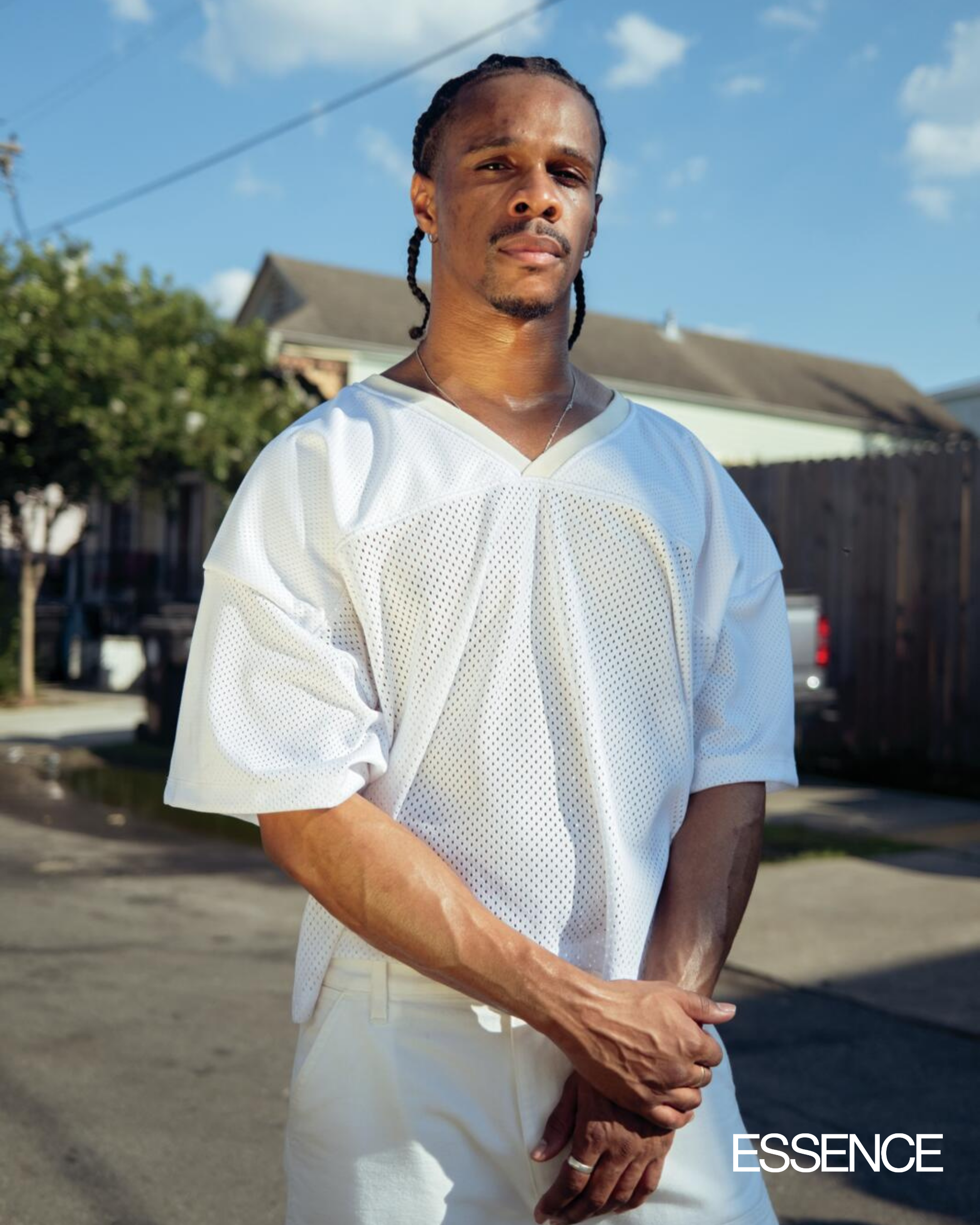
sounds of today as he leads marketing at Def Jam Recordings. Courtesy @e.buckles
I couldn’t have known when my family caravaned for five hours from my hometown of Birmingham, Alabama, to the ESSENCE Festival of Culture, (then known as ESSENCE Music Festival), which we casually called “ESSENCE Fest,” that it would be the genesis of a cherished 24-year tradition—one that would forever shape my vision of Black womanhood. Your Vieux Carré streets were reclaimed by Black women: boasting all our shades and shapes; sashaying in colorful, silky sundresses, two-piece linen sets and hoochie-mama shorts. They moved with a flirty conviction and were the very definition of “taking over for the ’99 and the 2000’s.” They were the most gorgeous sight my baby-girl eyes had ever seen, and I couldn’t wait to grow up and become one of them—a grown, fly woman living in the spirit.
Being the sister-friend of Black women that you are, you chose us, too. In 1995— under the visionary leadership of Mayor Marc Morial and Susan L. Taylor, then Editor-in-Chief of ESSENCE—what was supposed to be a one-time party to celebrate the 25th anniversary of the magazine, a publication created to center Black women, blossomed into a three-decades-long love affair.
While many would assume the “Party with a Purpose” found its permanent home here because no one outdoes you in a party, the truth is that nobody outdoes you in purpose. Your beloved “guardian of cultural symbols,” Baba Douglas Redd, graced the inaugural ESSENCE Fest logo with his Ashé. A vibrant red, purple and green African-inspired “25” doubled as a celebratory mask, adorned with piano keys and musical notes. Set against a royal blue, the bold gold text featured Aretha Franklin; Earth, Wind & Fire; Aaliyah; and Frankie Beverly featuring Maze—a Philadelphia band that New Orleans chose as its own.
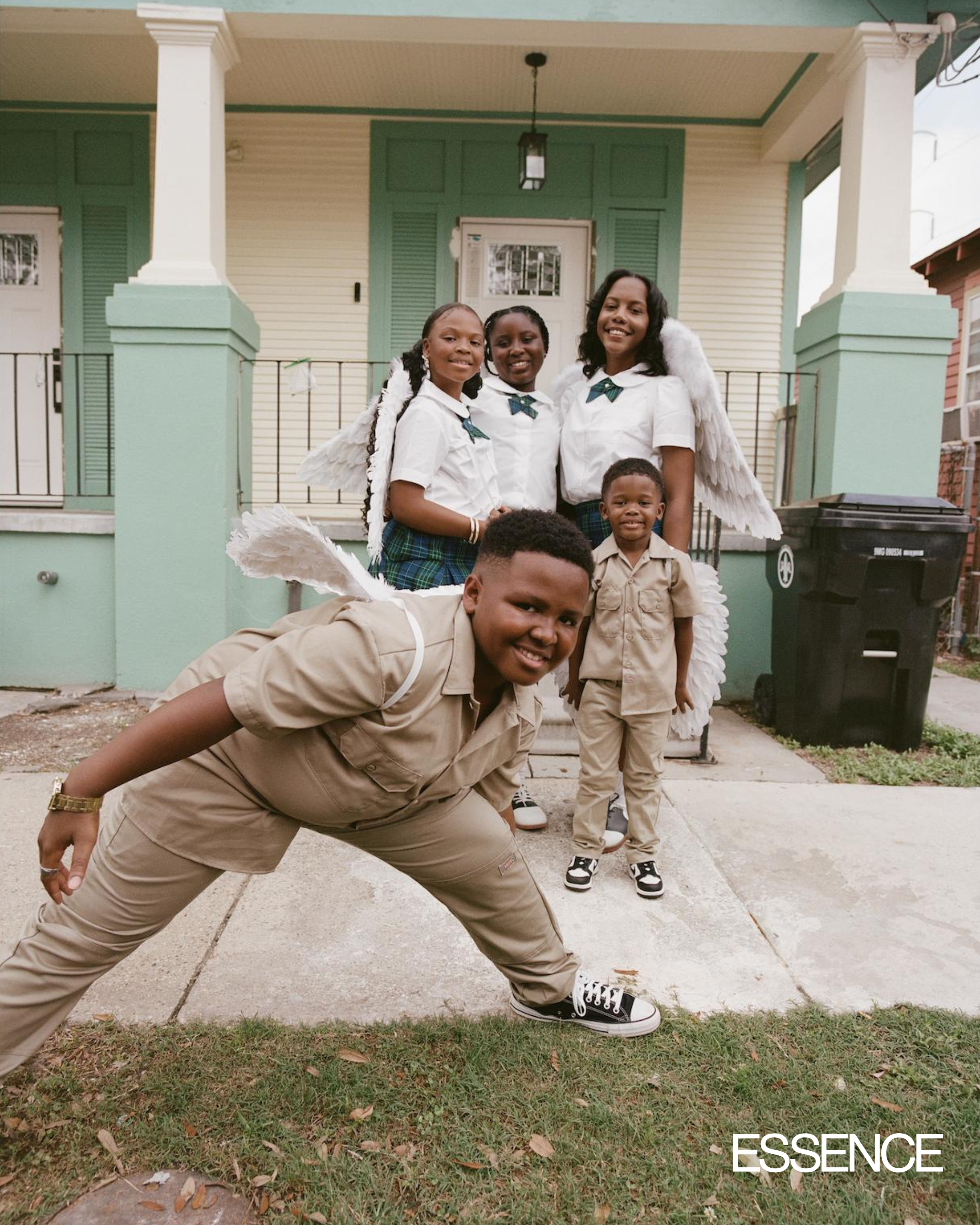
Hunter and Morgan Buggage enjoy an afternoon of play. Courtesy @e.buckles
My family wasn’t there that first year to witness “Maze,” as we lovingly call the soul band; but for over a decade, we’d close out ESSENCE Fest with their life-giving set. My first time, in ’99, holds a special place in my heart though. That night, as I stood among the sea of Black women and their loved ones draped in pristine white ensembles, to match Frankie’s fly wardrobe, I knew I was part of something divine. As the opening notes of “Joy and Pain” filled the air, the drums, congas and hand claps reverberated through our chests, igniting a familiar yet unrehearsed ancestral response. In unison, we chanted, “Go ’head, go ’head, go ’head,” our voices rising as Frankie, in his signature white head-to-toe linen, teased us with Maze’s famous synth sounds.
The deep, spiritual groove was a gateway to pure, uninhibited joy and freedom. And we moved as one band, one sound—electric slidin’ in all of our perfect and playful moves. With our singin’ and sanctified! It felt like I’d arrived in Black heaven. Watching thousands sway together, our spirits intertwined, I realized then that something special lived here—not merely in Frankie Beverly and Maze’s music, but in your essence, New Orleans.
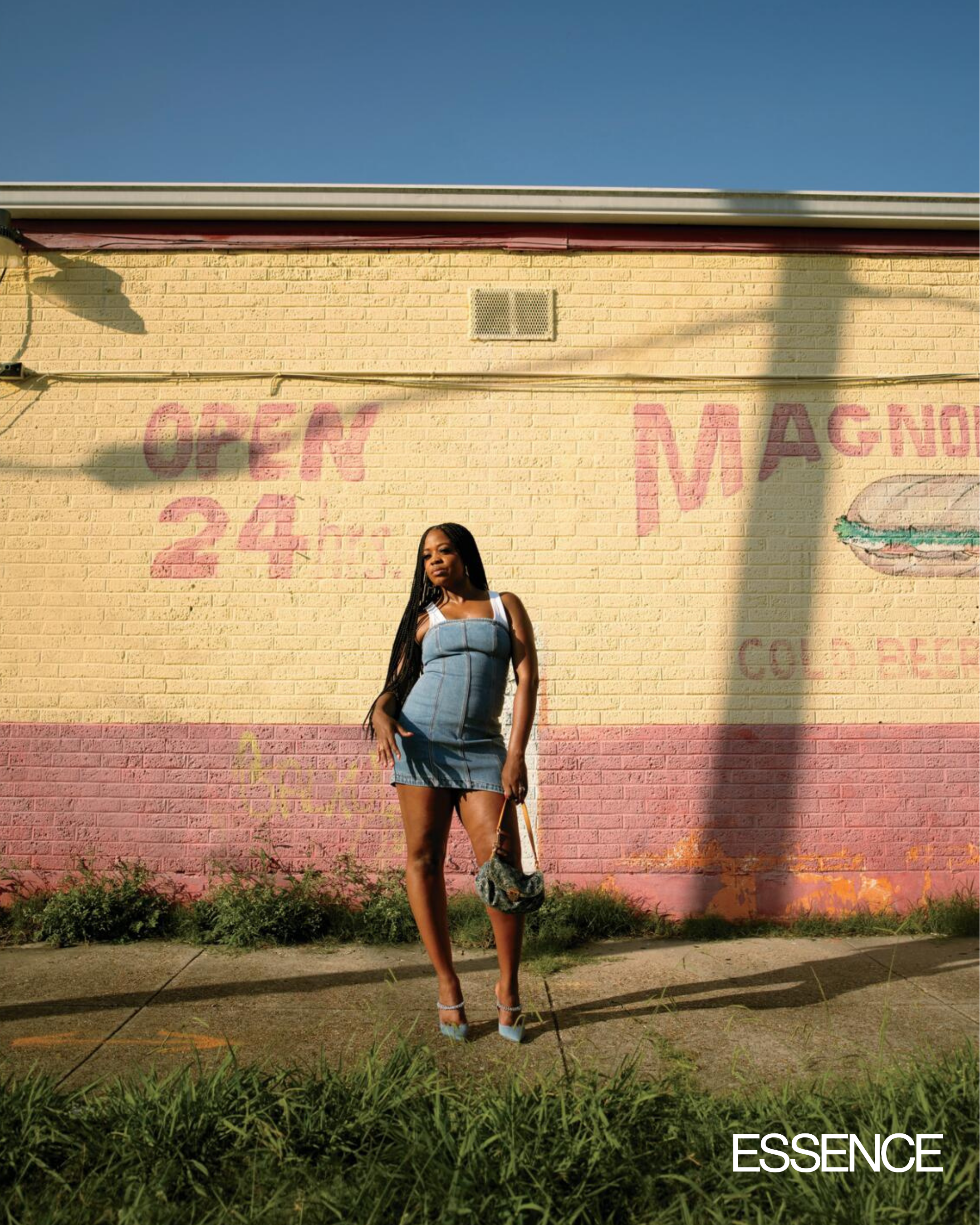
intertwines creativity and culture on a global scale. Courtesy @e.buckles
Maze always ended their shows with our unofficial Black national anthem, “Before I Let Go.” Introduced to the world on Maze’s “Live in New Orleans” album, it is more than just a song; it’s a loving signal used to mark the end of any proper 504 celebration. When we hear that famous “Whooooaaaaaa ho,” we all know exactly what it means: It’s time to gather all that belongs to you, whether it’s a purse, a to-go plate or somebody’s daddy, and make our way toward the exit. Unless, of course, we linger a little longer for the brass band’s final benediction; but I always prefer to tiptoe out as Frankie Beverly’s voice wraps around me.
You made me happy
This you can bet
You stood right beside me, yeah
And I won’t forget.
New Orleans, I won’t forget. I won’t forget how your bustling streets, lined with southern magnolias, hold the stories of ancestors who built you with bare hands, blood and brilliance. They whisper wisdom to us through intricate Adinkra symbols woven into French Quarter ironwork. “Se wo were fin a wo Sankofa a yennkyi”— reminding those who listen to reclaim what we’ve forgotten, for it was the African intellect and imagination that first taught Europeans how to cultivate rice and survive on your soil. Without our ancestors, there would be no New Orleans. This country tries to hide the truth of our genius, but your existence reveals what it means to build, resist and remember.
I won’t forget that your heart beats in Congo Square, where the bamboula rhythm kept the pulse of freedom. Code Noir may have given the enslaved a “day of rest” on Sundays, but you chose to keep drumming. You gave this country our music, dance and culture, which sustained us through the darkest times; and it all started there, in that sacred space. You birthed the foundations of jazz, R&B and funk. You are the keeper of the rhythm of our lives, ancient and ahead of our time.
I won’t forget how your women taught us to remain unbowed. When Governor Miró, fearing that Black women would threaten the social status of White women, passed the tignon laws, forcing us to wrap our heads in public, we wore our tignons with pride. We made them elaborate, colorful and bejeweled; we defied any attempt to diminish our free, fly Black womanhood. Even after the United States repealed the Spanish law, we still rocked our tignons, stunning and stunting—the embodiment of refusal, both subtle and overt.
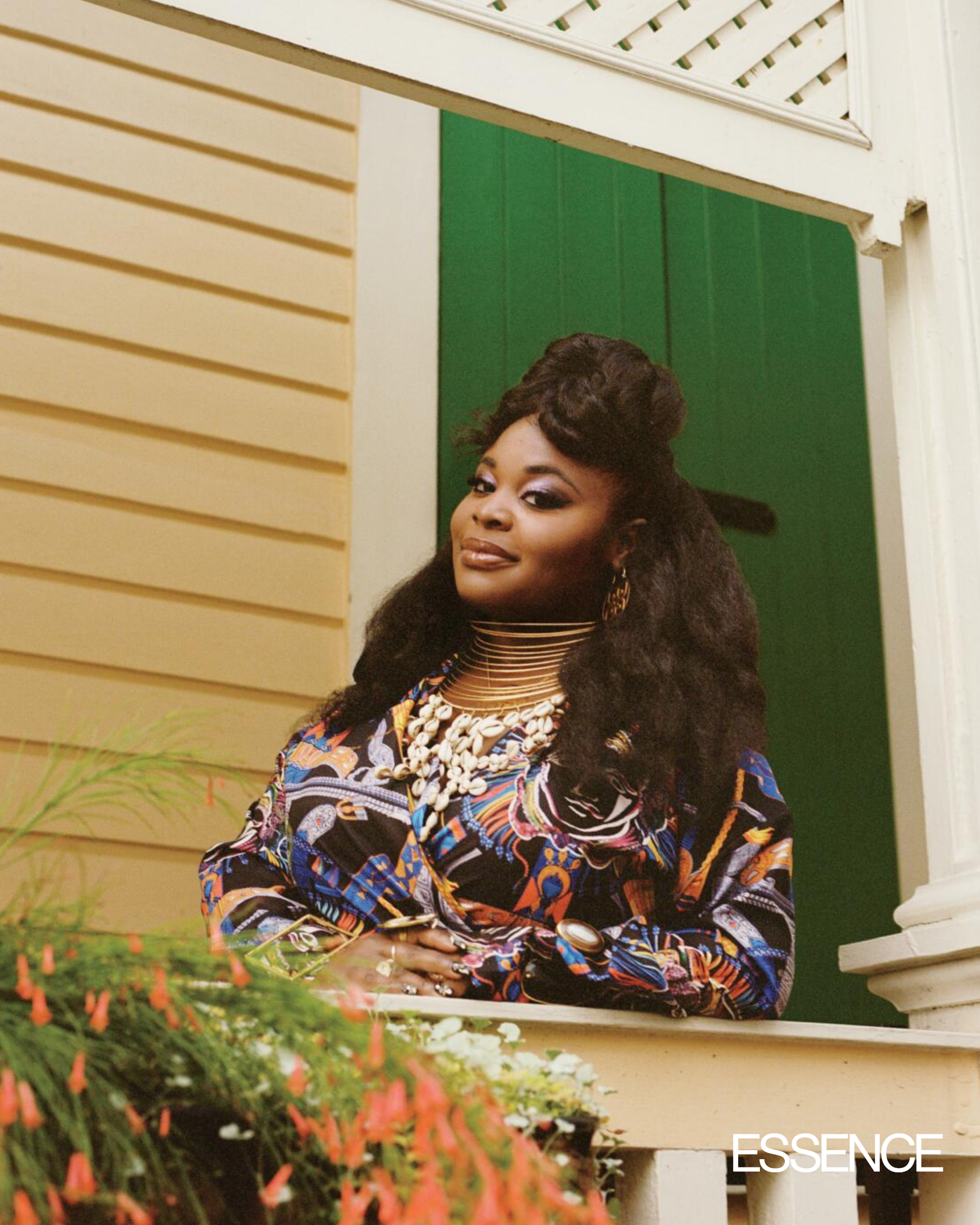
blend of spoken word and soulful music to life. Courtesy @e.buckles
You stood right beside me, yeah
And I won’t forget
I won’t forget that “Freedom or Death” is in your blood. The Haitian Revolution brought change to your shores—and you gave shelter to warriors like Charles Deslondes, who led the 1811 Slave Revolt, where more than 500 enslaved Africans united to fight for their freedom and establish an independent Black republic. Though the effort ended in their executions, it inspired a series of uprisings that inevitably overthrew the institution of slavery. Time and again, you teach us that the price of freedom is high—and worth the cost.
I won’t forget the Maroons’ audacious spirit in establishing new communities while providing for their kin. They found refuge in your swampy outskirts, with the aid of Indigenous tribes versed in the secrets of the land they called Bulbancha. The Black Masking Indians honor that enduring legacy, strutting through your streets in colorful suits of feathered splendor—each intricately hand-sewn and adorned with ribbons, sacred beadwork and sequins. Your traditions aren’t simply pageantry but an ode to the resistance of African and Native American peoples. You show us what it means to be both “pretty, pretty” and more than meets the eye.
I won’t forget that the Sisters of the Holy Family Convent, founded by Henriette Delille, were among the first in the nation to formally educate Black children. When the Sisters created a haven for women of African descent called to spiritual life, they used their autonomy to defy oppressive systems and teach Black children, both free and enslaved. This revolutionary act had a lasting impact, and St. Mary’s Academy, a renowned Catholic school in New Orleans East, is a living testament to their righteous rebellion. The Sisters’ groundbreaking work laid the foundation for Black education—a courageous and visionary legacy.
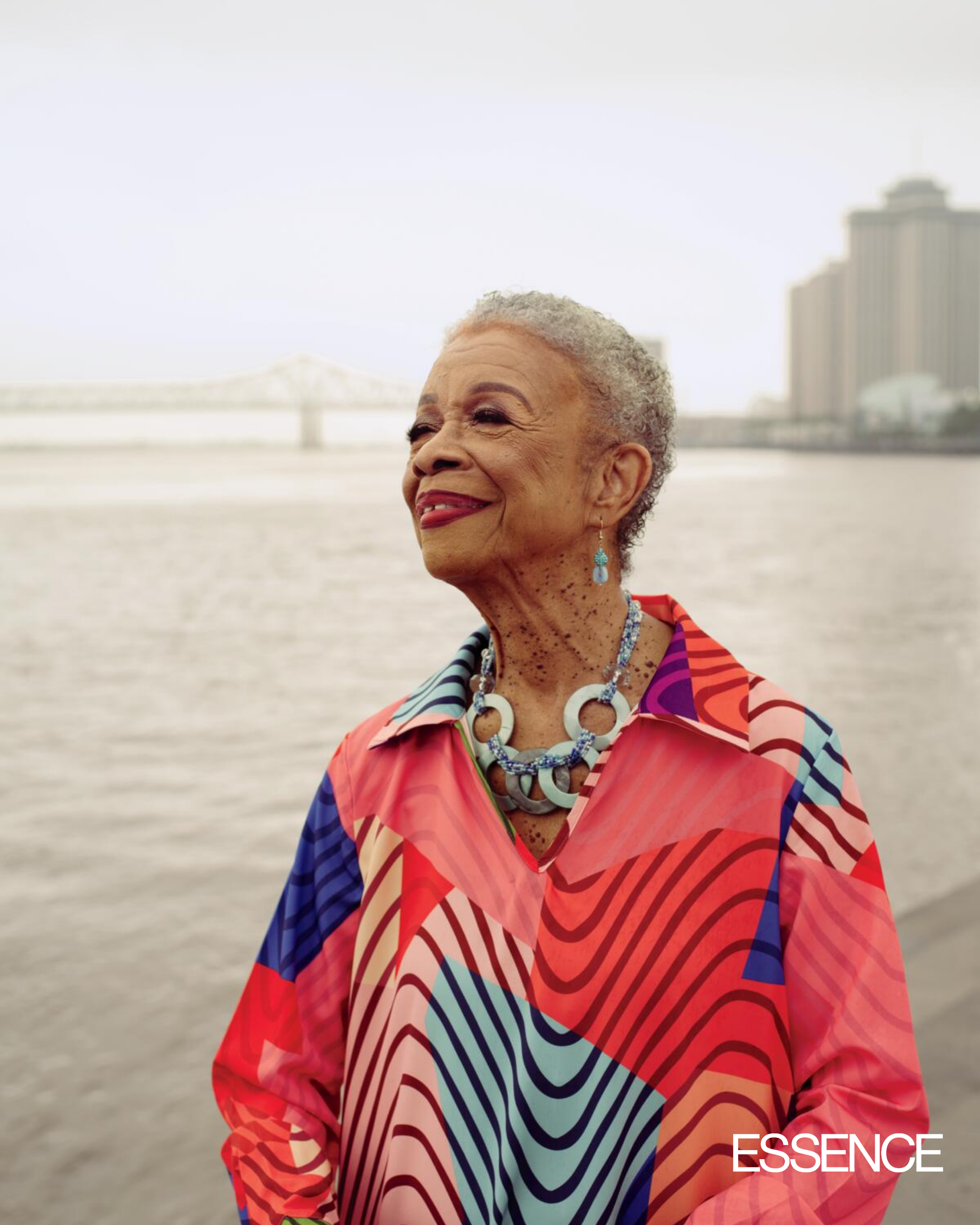
scene, enchanting audiences with her deep connection to the city’s musical
heritage. Courtesy @e.buckles
You stood right beside me, yeah
And I won’t forget.
July 2007 marked a turning point for us, New Orleans. The ESSENCE Festival had its homecoming post–Hurricane Katrina, welcoming back beloved figures like Beyoncé, then-Senator Barack Obama and, of course, Maze featuring Frankie Beverly; cultural titan Baba Douglas Redd, the festival’s original logo creator, was welcomed to the ancestral realm; and I began my journey as a high school English teacher, standing on the shoulders of Delille. I had heard your call and made my way to you, a universe I had been orbiting since girlhood. But this time, I came to stay.
As I settled into my new role, I was fortunate to work at a school with a staff composed mainly of veteran Black teachers—a rarity at the time. In the aftermath of the storm, there was a mass firing of 7,500 educators, predominantly Black women. Those who fought to return often faced a cold reception and vilification of their work. The state had deemed them school-system failures—while novice teachers like myself were hailed as saviors, which was far from the truth. Yet even amid their immense grief over losing their physical and spiritual homes; their loved ones to a country’s neglect; and due respect for their life’s work, they still found the capacity to nurture not only our students but young educators like me. They shaped me into who I am today, by sharing the history of Black resistance in New Orleans and how the fight for humanity informs the present. Above all, they taught me how to love and celebrate life, even in the eye of the storm. I will forever defend their legacy as the backbone of your culture and brilliance, for there is no culture without your first teacher: the Black woman.
Their support and belief in me would prove invaluable as I navigated my own challenges during my first year of teaching. Despite passing the English portion of my teacher-certification exams with flying colors, I struggled with math, failing 11 times, while receiving little support from my preparation program. As a result, I was dismissed at the end of my first year. But New Orleans, your Black veteran teachers said I belonged. They believed I could pass that test. And they stood right beside me. I won’t forget.
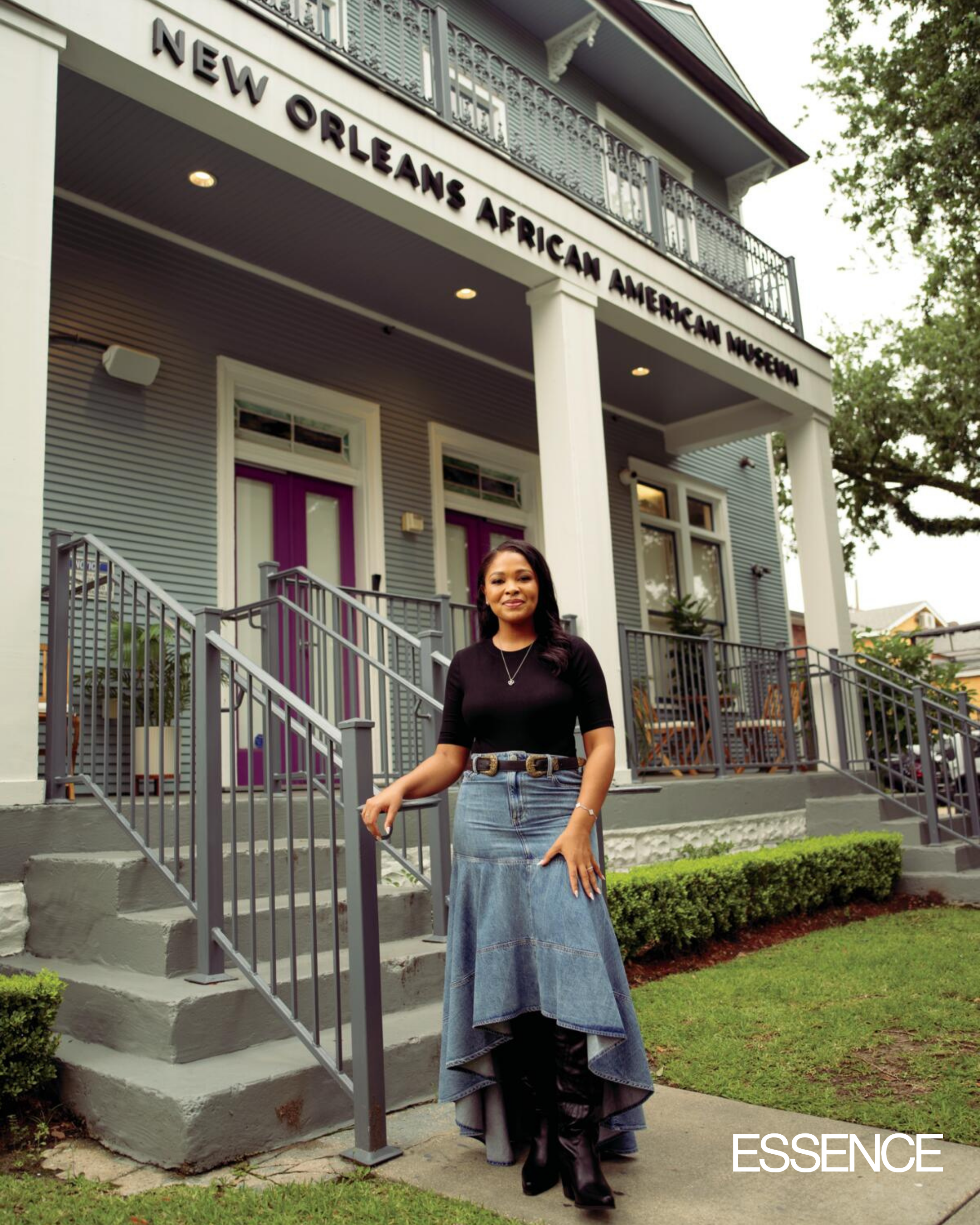
innovation. Courtesy @e.buckles
I spent my lunch breaks learning alongside our students in the back of the veterans’ math classes. On weekends, they invited me to their kitchen tables to share test-taking strategies; and whenever I felt down bad, Mrs. Stokes, Mr. and Mrs. Peters, Mrs. Dennis and Mr. Grady would remind me I had been called to teach Black children and do it well. With their love and guidance, I not only passed the test within months but saw the program that had dropped me ask me to return, as my classroom was exemplary. Of all my roles, none has been greater than “teacher,” and my guides made that possible. The day I earned my Master of Arts in Teaching and walked across the stage, my former principal and beloved mentor, Mrs. Laurie, said, “We told you, little girl, you’d never walk alone.”
And that is the enduring lesson you taught me: In your city, you never walk alone. We walk by tens, hundreds and thousands, in traditions rooted in African rituals. When those brassy notes and drum vibrations hit our block, we roll out of our homes, cars, churches, Black-owned bars and social clubs to join the grand procession pushing forward. At times, it may be unclear who you are marching for—but the vibrant parasols, waving handkerchiefs and footwork surrendering to the spirit of togetherness matter most. We march. We dance. Whether in times of grief or moments of celebration, we release our hearts in your Jazz Funerals and second line parades. This city has a majestic way of reminding Black folk of who we were before others tried to redefine us. And so we all walk differently: heads held high, bodies swaying freely and never, ever alone.
My former students, my forever babies, taught me that loving them meant walking with the spirit of those who shaped this city and, inevitably, their lives. Now they are in their early thirties, many years removed from our high school English classroom—and yet I still carry their stories in my gut. They would write about missing Black hands holding their futures, their loved ones back in their arms. Their Teedy’s sittin’ on the porch, huckabuck ladies in the Seventh Ward, remembering the Middle Passage at the Village Ovah Da Rivah, hearing storms blow through without anxiety, makin’ groceries at Circle Food in Tremé. Adella Adella the Storyteller reading Anansi tales at Community Book Center; Mama Penni carrying on Mama Oretha Castle Haley’s legacy at the Learning Workshop; and the sound of Baba Kalamu ya Salaam’s voice in their Ninth Ward hallways, pushing them to tell their stories.
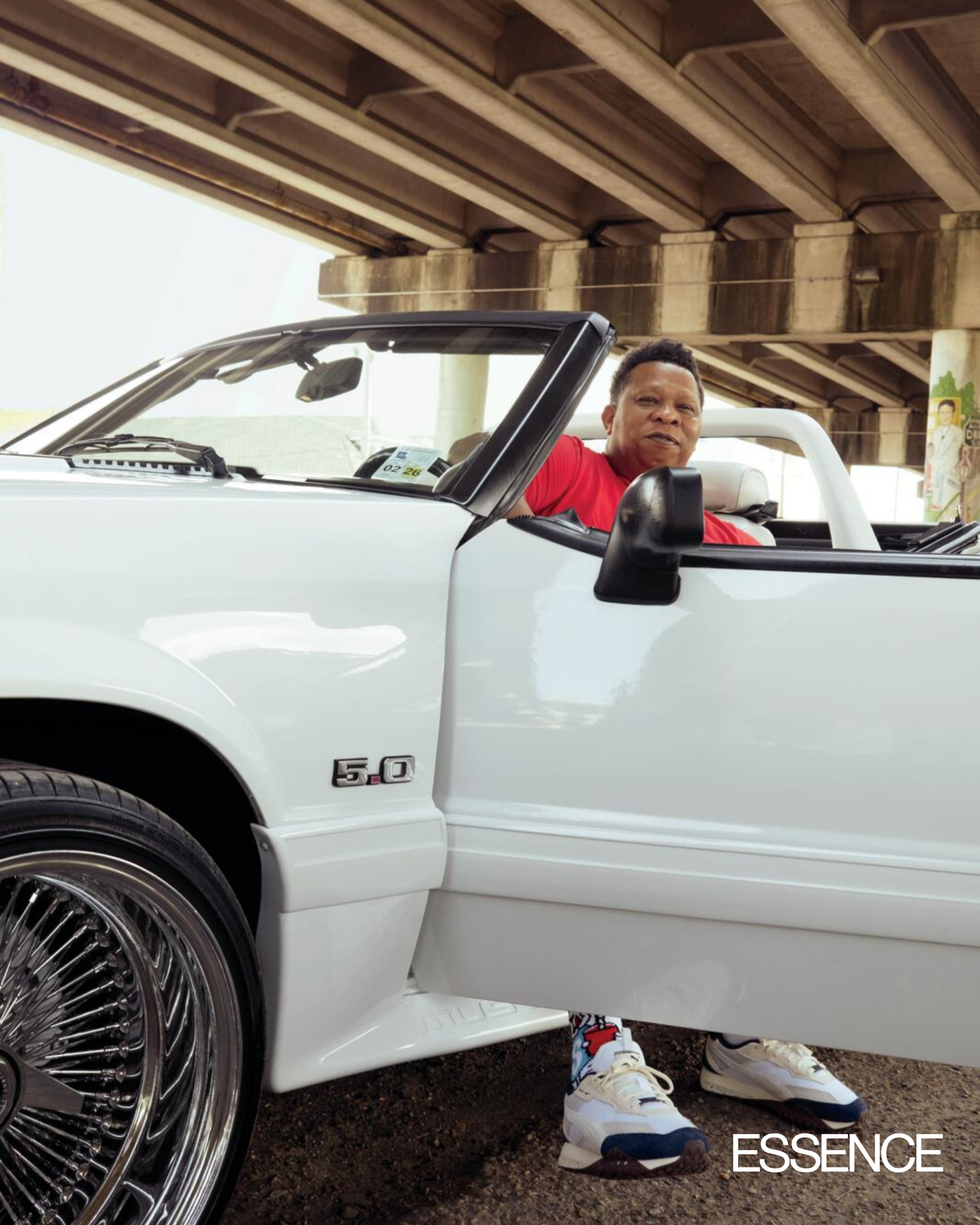
They miss the home that was, even as they carry its essence within them. They are the keepers of traditions now—and through ritual, they proudly honor and celebrate their Egún, mentors and freedom fighters, ensuring their legacy lives on for generations to come. In this spirit of reverence and remembrance, we gather on Super Sunday, a day deeply rooted in your cultural heritage. My forever babies and me, their babies and them, all shimmying shoulder-to-shoulder through this village we love. It’s a Black parade!
The air vibrates with the beat of the brass band, some of my babies drumming and yellin’, “Wassam, Mrs. RAWjuhs?!” as they march through the streets. Others, radiant in their Black Masking Indian suits, chant ancient words of power alongside their tribes and tambourines, their voices mesmerizing the crowd. My boys, now grown into charismatic men, flash their golden grins with the swag of true Southern playas. The sun catches the glint of their teeth and bounces off their radiant, sun-kissed skin as they flex. My girls, now blossomed into vibrant women, playfully roll their eyes and giggle, their laughter filling the air as we gravitate toward one another, wrapping our arms around each other in the sweetest embrace. More of my forever babies gallop through on horseback, their brothers riding alongside them; and we all look up in awe at their African God–like figures.
The scent of fried fish and creole dishes, seasoned to perfection and reminiscent of Haiti, wafts from the food trucks and sidewalk set-ups that offer staples like red beans and rice. An older gentleman, the color of fine cinnamon, breaks through the crowd, with footwork that cannot be taught, only felt—while proclaiming, “I’m 55 and still alive!” Others are dippin’ and swaying to the latest Bounce track blasting from the subwoofer speakers in their trunks, their booties swirling in perfect sync with that B-E-A-T.
For this moment in time, we are in blissful harmony with life, and I am transported back to my first ESSENCE Fest. I had yet to go to a second line or a Super Sunday. I didn’t know this city’s long-standing Black history or have the loving community I do now. But I did know—even at 14—I wasn’t walking alone then, either.
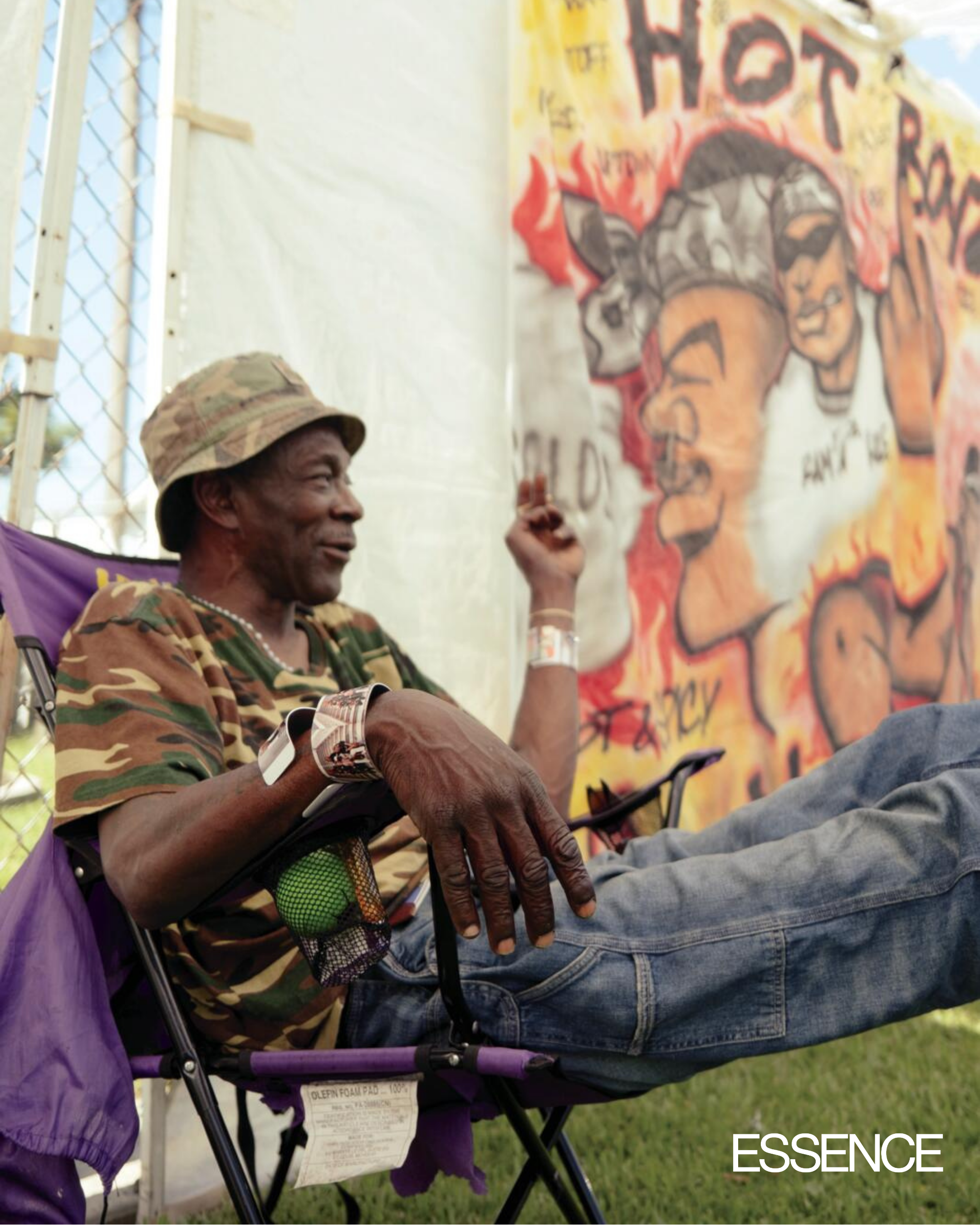
documented Black New Orleans. Courtesy @e.buckles
Whether we walk these streets as locals or as visitors, we must acknowledge that ESSENCE Fest would not be the haven it is without the heart-posture of Black New Orleanians. You have taught me that love is not just a feeling but a sacred responsibility—a love that deserves investment and reciprocity. The economic well-being of your Black citizens matters. The music, foodways and traditions have been hard-earned. We must remember that the freedom felt in this city ain’t free, and its Black community is owed an outstanding debt for all the ways it has stood by us. I won’t forget, and neither should you.
I am fortunate to live and love here. Yet I am mindful not to claim you as my own, for you belong to the descendants of the Africans who built this city—visionaries like Mr. Leon A. Waters and Kristina Kay Robinson, who unveil your hidden history and reimagine life in a free Black republic; fierce advocates like Sunni Patterson and Cierra Chenier, whose voices rise against adversity and erasure; my forever babies and their families, whose roots are intertwined with your soul; brave leaders like Tremé’s Mr. Jerome “Big Duck” Smith; Black veteran teachers, whose intellect has shaped generations; Mama Vera and Mama Jenn, who be lovin’ Black children on Bayou Road; and cultural workers like phlegm, who preach the truth that “Everything you love about New Orleans is because of Black people.”
It’s true for me, too. Everything I love about you is because of Black people, your people.
Weekly, without fail, a Black New Orleanian will hear my southern drawl and ask, “Where are you from?” I reply, “I’m from Alabama, but I’ve been here for 17 years.” Then they say, “Oh! You are one of us, nah, BAYbeh!” I always take the invitation, but I know it’s just southern pleasantry—because you draw hard lines in the silt about who lays claim to your muddy bosom, AS YOU SHOULD. That storm taught you that not everyone knows what it is to miss New Orleans. But I am grateful that you chose to love me back when I first fell in love with you, 24 years ago.
Thank you, ESSENCE Fest, for starting a tradition that has shaped Black households and girls’ trips for 30 years. Thank you for recognizing that what was originally a one-time anniversary party could—and should—become an enduring celebration of Black life. And thank you for introducing me, and so many others, to the greatest city on Earth: New Orleans.
CREDITS
Photography & Directing by Edward Buckles, Jr.
Assistant Director: Marcus Brown
Photography Assistants: J. Alejandro Moreno, Peter Philips and Val Dagrain
Gaffer: Cyr Eugene
Production Assistant & Movement Director: Ammara Khalid
Retouching: Molly Solorzano







